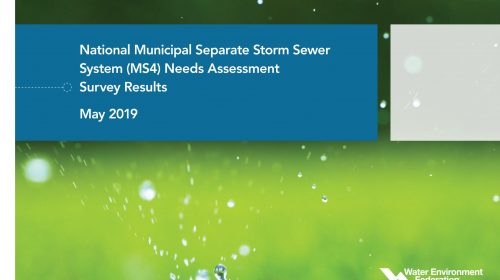Water Environment Federation (WEF) salutes the American Society of Civil Engineers and its Environmental & Water Resources Institute (EWRI) for adding a stormwater chapter to the 2021 Infrastructure Report Card—the first time drainage structures and facilities will be graded in a widely subscribed benchmark the Society issues every four years. The category will join Aviation, Dams, Inland Waterways, Ports, Rail, Schools, Solid Waste, Hazardous Waste, Bridges, Roads, Drinking Water, Levees and Public Parks chapters.
|
|
| Authors of the first MS4 report have helped ASCE researchers prepare for a 2021 Infrastructure Report Card stormwater chapter. |
The ASCE action dovetails mounting pressure on stormwwater infrastructure owing to urban population growth and development. “Effective stormwater management in our cities and along our highways affects nearly every person every day,” says EWRI Governing Board’s Eric Loucks, P.E. “With more frequent, intense storms on top of flooding events, we’re seeing more stormwater runoff, risking flooding of our communities, erosion of our streams and pollution of our water.”
“We need effective management that can treat stormwater as a beneficial resource, putting the water to work where it’s needed most,” he adds. “Including stormwater infrastructure as a Report Card category will help policymakers get a better handle on the magnitude of the problem across the United States and how we can move forward in taking advantage of this valuable resource.”
The WEF Stormwater Institute led an early-2019 effort to gather the first-ever analysis of the U.S. stormwater sector needs, which revealed an estimated $7.5 billion annual funding gap and identified top priorities and challenges across the country. The inaugural Municipal Separate Storm Sewer System (MS4) Needs Assessment Survey reflects an effort to learn more about sector nature and investment requirement at a scale that has never been attempted and will assist 2021 Infrastructure Report Card analysis.
“The inclusion of stormwater infrastructure in ASCE’s report card will provide a much-deserved boost in visibility for infrastructure that is vital to communities across the country,” affirms WEF Executive Director Eileen O’Neill. “We hope that adding stormwater to the report card will result in more resources and focus being directed to this essential part of our infrastructure, and subsequent improvements to water quality.”
ASCE’s 2017 Infrastructure Report Card rated the overall condition of the nation’s infrastructure a cumulative grade of “D+,” with an investment gap of $2 trillion. A stormwater chapter in the next edition reflects decision-makers’ increased interest in sustainable solutions for flooding and water pollution problems. ASCE’s state report card committees have periodically graded stormwater infrastructure, most recently in California, Georgia, Nevada, Pennsylvania and Washington. — Water Environment Federation, Alexandria, Va., www.wef.org

 The ASCE Committee on America’s Infrastructure, made up of 28 engineers from across the country with decades of expertise in all categories, volunteers to work with ASCE Infrastructure Initiatives staff to prepare the Infrastructure Report Card, the most recent version of which is shown here. The Committee assesses all relevant data and reports, consults with technical and industry experts, and assigns grades using the following key criteria:
The ASCE Committee on America’s Infrastructure, made up of 28 engineers from across the country with decades of expertise in all categories, volunteers to work with ASCE Infrastructure Initiatives staff to prepare the Infrastructure Report Card, the most recent version of which is shown here. The Committee assesses all relevant data and reports, consults with technical and industry experts, and assigns grades using the following key criteria: